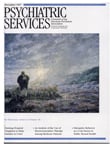To the Editor: In his article on the depersonalization of health care in the March 1999 issue, Dr. Zealberg (
1) takes us on a nostalgic journey back to the roots of the healing professions, namely, the sanctity of the relationship between the doctor-therapist and patient. He uses Buber's I-Thou, I-It paradigm to illustrate how dehumanization in health care erodes this relationship and can interfere with caring for the patient.
Those of us who have worked with combat veterans know that dehumanization is an essential ego defense that makes war possible. When the enemy is perceived as a nonhuman, it becomes easier to kill. In the extreme, this type of objectification leads to the commission of atrocities (
2,
3). The recent events in Yugoslavia remind us just how quickly such a defense can erupt; the Holocaust of World War II serves as yet another reminder.
When I was in training over 20 years ago, I learned about the healing power of the doctor-patient relationship. My mentors spoke of the healing professions as a "calling" rather than a career choice. I was taught that people pursue this calling in response to a "reparative need" (
4,
5) and that caregivers who are successful temper their own needs in deference to the patient's needs. Patient and therapist create a therapeutic alliance—a sacred bond in which transference (and countertransference) reactions, once fully understood, promote healing.
The 1980s were exciting times for psychiatry. An explosion of scientific discoveries in molecular biology, neuroscience, and psychopharmacology led to the development of a panoply of more effective psychotropic agents. These discoveries pushed psychiatry into new frontiers in medicine, promoting the Talmudic mandate of "tikkun olam," literally translated from the Hebrew as "mending or repairing the world." Yet, without the I-Thou relationship, no healing could take place, for a "dose of the doctor goes with every prescription" (
4,
5). When we sit and help our patients bear their suffering, we enter an intimate and sacred space—a spark of the divine rests between therapist and patient.
On the dawn of a new millenium, we seldom hear the term "calling" in reference to our professions. Dr. Zealberg reminds us that despite managed care, the business of medicine remains that of healing and caring for the sick. If we are to survive as caring practitioners, we must attend to the sacred within each of us and within each of our patients. Once the I-It relationship becomes the model, we cannot guarantee that we will "do no harm."

